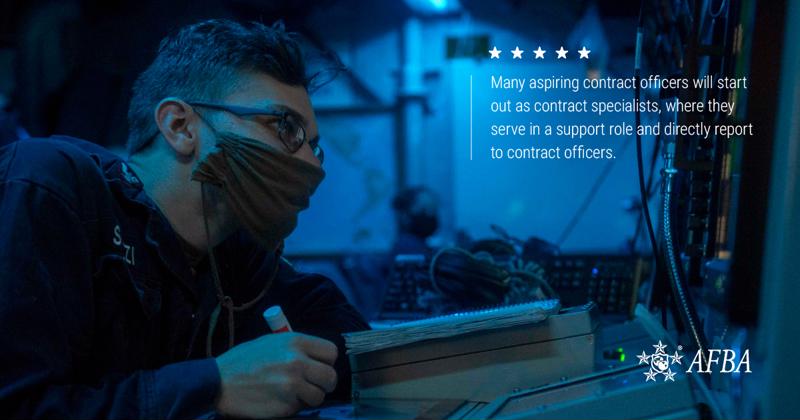Government contracting roles, such as contract officer and contract specialist, can be challenging and rewarding careers. However, students and emerging professionals may not be familiar with the primary responsibilities, job requirements or internship opportunities related to this field. Read on to learn how to prepare for and find work as a contracting professional.

What do contract officers and specialists do?
The Federal Acquisition Institute (FAI) defines the contract officer (CO) as "a person who can bind the Federal Government of the United States to a contract. Contracting Officers hold a warrant that allows them to negotiate on behalf of the United States Government. As the Government's agent, only COs may execute, modify, or terminate a contract."
Many aspiring contract officers will start out as contract specialists, where they serve in a support role and directly report to contract officers. Both are civilian roles within the federal government's acquisitions workforce, which is responsible for procuring and selling goods and services on behalf of government agencies. These goods and services may include everything from new information systems, aircraft and military vehicles to cutting-edge research, uniforms and office supplies.
The FAI explains that contract officers are responsible for selecting vendors and overseeing that contractual agreements are legally compliant, appropriately funded, fair and impartial. It is also a CO's job to ensure that contracts are providing maximum value and that taxpayers' money is being responsibly spent.
While the role largely involves contract negotiation and administration, contracting professionals also have the chance to meet with vendors, view and assess the types of products and services under consideration, and gain hands-on experience related to the agencies and programs they are working to support. As a result, some travel may be involved. The FAI explains that contracting professionals are needed throughout the U.S. and overseas, where they are employed by essentially all government agencies and programs, including the branches of the armed forces.
Contracting careers can be professionally rewarding and well-compensated. According to Glassdoor, COs typically make between $57,000 and $128,000 per year, with average earnings of roughly $90,000.
How can someone become a contract officer or specialist?
Students who wish to apply for internship opportunities in contracting can learn more about available internships through the FIA website. Opportunities include government-wide internships like Pathways Program as well as agency-specific programs such as the Department of Homeland Security's Acquisition Professional Career Program (APCP) or the Department of the Navy's Naval Acquisition Development Program (NADP).
Full-time contract officer and specialist positions are advertised through the federal government's career portal, USAjobs.gov. Anyone interested in searching for and applying to these roles will likely need to go through this portal.
According to the FIA, a prospective contracting professional should hold a bachelor's degree. An advanced degree may also be desirable or required for certain positions. The CO role is classified as an 1102 position in the Contracting Series by the U.S. Office of Personnel Management, so prospective candidates should review the specific qualifications.
Applicants interested in a contracting career should generally possess some educational or professional experience in the following subjects:
- Contracts.
- Law.
- Business.
- Accounting.
- Finance.
- Economics.
- Quantitative reasoning.
- Supply chain management.
- Industrial distribution.
- Marketing.
- Market research.
- Communications.
To be successful in a contracting career, one should possess strong communication skills, analytical abilities, and a penchant for problem-solving which will be important in cost analysis, contract negotiation and other administrative duties. COs typically operate in team environments, so collaboration is key as well. Professionals in the contract specialist and contract officer positions are constantly learning and participating in agency-specific training programs.


